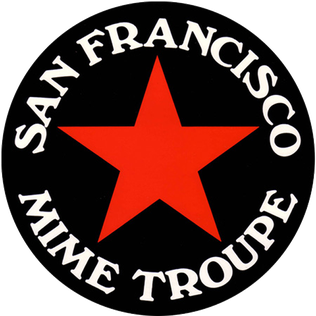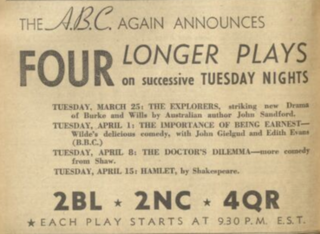
The Burke and Wills expedition was organised by the Royal Society of Victoria in Australia in 1860–61. It initially consisted of 19 men led by Robert O'Hara Burke, with William John Wills being a deputy commander. Its objective was the crossing of Australia from Melbourne in the south to the Gulf of Carpentaria in the north, a distance of around 3,250 kilometres. At that time most of the inland of Australia had not been explored by non-Indigenous people and was largely unknown to the European settlers.

Volpone is a comedy play by English playwright Ben Jonson first produced in 1605–1606, drawing on elements of city comedy and beast fable. A merciless satire of greed and lust, it remains Jonson's most-performed play, and it is ranked among the finest Jacobean era comedies.

Thomas Patrick McKenna was an Irish actor, born in Mullagh, County Cavan. He had an extensive stage and screen career.

Robert O'Hara Burke was an Irish soldier and police officer who achieved fame as an Australian explorer. He was the leader of the ill-fated Burke and Wills expedition, which was the first expedition to cross Australia from south to north, finding a route across the continent from the settled areas of Victoria to the Gulf of Carpentaria. The expedition party was well equipped, but Burke was not experienced in bushcraft. A Commission of Inquiry held by the Government of Victoria to investigate the failure of the expedition was a censure of Burke's judgement.

William John Wills was a British surveyor who also trained as a surgeon. He was the second-in-command of the Burke and Wills expedition, which was the first expedition to cross Australia from south to north, finding a route across the continent from the settled areas of Victoria to the Gulf of Carpentaria. He and the expedition leader Robert O'Hara Burke both died of exhaustion on the expedition's return journey.

George Alphonsus Cooper was an English actor and voice artist. He died in November 2018 at the age of 93.

The San Francisco Mime Troupe is a theatre of political satire which performs free shows in various parks in the San Francisco Bay Area and around California. The troupe does not, however, perform silent mime, but each year creates an original musical comedy that combines aspects of commedia dell'arte, melodrama, and broad farce with topical political themes. The group was awarded the Regional Theatre Award at the 41st Tony Awards.

John King was an Irish-born British soldier who achieved fame as an Australian explorer. He was the sole survivor of the four men from the ill-fated Burke and Wills expedition who reached the Gulf of Carpentaria. The expedition was the first to cross Australia from south to north, finding a route across the continent from Melbourne in Victoria to the Gulf of Carpentaria in Queensland.
Kerry Kathleen Fitzpatrick known as Kate Fitzpatrick, is an Australian television, film, and theatre actress.
John Hugh d'Allenger Kershaw was a British screenwriter and script editor. He edited the entire first season of the television program Bergerac, and contributed to others including The Bill and Armchair Theatre.
Braham Sydney Murray, OBE was an English theatre director. In 1976, he was one of five founding Artistic Directors of the Royal Exchange Theatre in Manchester, and the longest-serving.
Michael Elliott, OBE was an English theatre and television director. He was a founding director of the Royal Exchange Theatre in Manchester.
A Romance of Burke and Wills Expedition of 1860 is a 1918 Australian silent film. The plot is fictional and is loosely based around the Burke and Wills expedition.

Peter Trevor Collingwood was an English-born actor who appeared in theatre roles, films, miniseries and serials from 1938 to 2003 in his native England and Australia. Collingwood was known for his portrayal of judges, military men and upper-crust befuddled types. He was also a playwright.
Burke and Wills Plant Camp is a heritage-listed campsite near Betoota within the locality of Birdsville, Shire of Diamantina, Queensland, Australia. It is also known as Return Camp 46 and Burke and Wills Camp R46. It was added to the Queensland Heritage Register on 11 December 2008.
"The Mystery of a Hansom Cab" is a 1961 Australian television drama play based on Barry Pree's 1961 play adaptation of the novel by Fergus Hume. It appeared as an episode of the anthology series The General Motors Hour. It aired on 6 August 1961 in Sydney and on 19 August 1961 in Melbourne.

The Dig Tree is a heritage-listed, blazed, eucalyptus tree at Nappa Merrie Station, Durham, Shire of Bulloo, Queensland, Australia. It was blazed on 21 April 1861. It was added to the Queensland Heritage Register on 28 February 2003.

The Burke, Wills, King and Yandruwandha National Heritage Place is a heritage-listed historic precinct on the Birdsville Track, Innamincka, South Australia, Australia. It was added to the Australian National Heritage List on 22 January 2016.

The Firehouse Theater of Minneapolis and later of San Francisco was a significant producer of experimental, theater of the absurd, and avant guard theater in the 1960s and 1970s. Its productions included new plays and world premieres, often presented with radical or inventive directorial styles. The Firehouse introduced playwrights and new plays to Minneapolis and San Francisco. It premiered plays by Megan Terry, Sam Shepard, Jean-Claude van Itallie, María Irene Fornés and others; and it presented plays by Harold Pinter, John Arden, August Strindberg, John Osborne, Arthur Kopit, Eugène Ionesco, Berthold Brecht, Samuel Beckett and others. In a 1987 interview Martha Boesing, the artistic director of another Minneapolis theatre, described the Firehouse Theater as "the most extreme of all the groups creating experimental theater in the sixties, and the closest to Artaud’s vision." Writing in 1968, The New York Times said that the Firehouse Theater "has been doing avantgarde plays in Minneapolis nearly as long as the Tyrone Guthrie Theater has been doing the other kind, and with much less help from the Establishment." That same year, when a federal grant was provided to support the Firehouse, it was pointed out in the Congressional Record that the Firehouse Theatre "is the only major theatre dealing experimentally with the writing of plays and their production outside the metropolitan New York area."

The Explorers is a 1952 Australian radio play about the Burke and Wills expedition by John Sandford. It was Sandford's first play.












